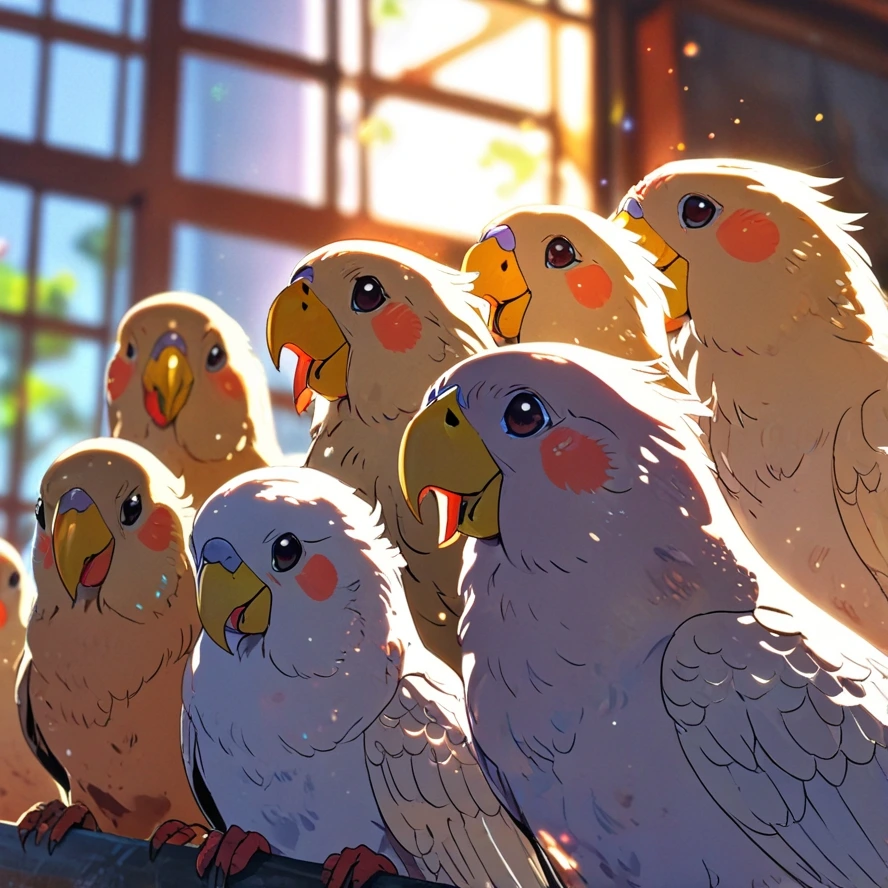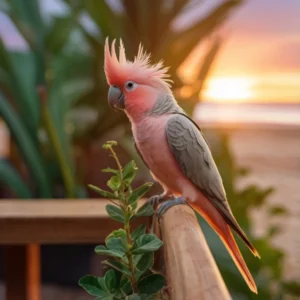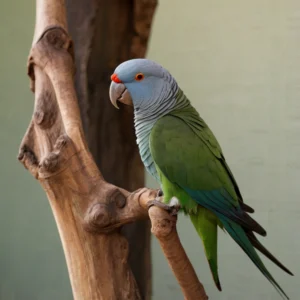Table of Contents
1. Can Cockatiel Birds Talk?

Can Cockatiel Birds Talk? A Complete Guide the short Answer is Yes, cockatiels can learn to talk! While they are not as skilled as parrots in mimicking human speech, they are capable of learning a few words and short phrases. Male cockatiels, in particular, are known to be more vocal and have a greater ability to mimic sounds. Female cockatiels can also talk, but they are generally quieter. Their ability to talk depends on how much time and effort you invest in training them. With the right approach, you can teach your cockatiel to say some simple words and phrases.
2. How Do Cockatiels Communicate?

Cockatiels primarily communicate through whistles, chirps, and other vocalizations. They use these sounds to express their emotions and communicate with their owners. However, with patience and repetition, cockatiels can mimic human speech and even recognize certain words. They might not always speak clearly, but their attempts to communicate are adorable. Understanding their body language and vocal cues is key to forming a bond and teaching them to talk.
3. Differences Between Talking Birds

Cockatiels aren’t the most proficient talkers compared to species like African Grey Parrots or Budgies. While cockatiels can learn a handful of words, they typically do not have the vocal range or clarity of larger parrots. That said, their ability to whistle and mimic certain sounds, like doorbells or alarms, makes them special. Their smaller size and friendly nature make them easier to handle, and they bond deeply with their owners, which is essential for teaching them to talk.
4. Why Do Cockatiels Talk?

Cockatiels talk to interact with their owners and seek attention. By learning words, they can get closer to you and communicate their needs. They may imitate your speech because they view you as part of their flock. Cockatiels also enjoy the stimulation that comes with talking, and it keeps them mentally engaged. Talking is a form of enrichment for them, especially if they are spending a lot of time indoors.
5. Can All Cockatiels Talk?

Not all cockatiels will learn to talk. Some are naturally more vocal, while others might prefer to stick to their chirps and whistles. Male cockatiels are generally more likely to talk than females. However, every bird is unique, and some cockatiels may never speak, even with consistent training. Don’t be discouraged if your cockatiel doesn’t talk immediately—bonding with them is what’s most important.
6. How to Start Teaching Your Cockatiel to Talk

Start training your cockatiel to talk by using short, simple words like “hello” or their name. Repetition is crucial, so say the words consistently every day. Make sure you speak clearly and in a gentle, friendly tone. Early morning or evening, when your cockatiel is calm, is the best time for training. Keep your sessions short, around 10 to 15 minutes, so your bird doesn’t lose interest.
7. Patience is Key

Training a cockatiel to talk requires patience. Birds learn at their own pace, and it may take weeks or months before you hear your cockatiel speak its first word. If your bird seems uninterested at first, don’t give up. Keep the training sessions light-hearted and fun, and always offer plenty of praise when your cockatiel shows progress. A patient approach will yield the best results over time.
8. Choosing the Right Words

Select words that are easy for your cockatiel to pick up. Words with sharp, clear sounds, such as “hello,” “pretty,” or “good bird,” are often easier for them to mimic. Avoid overly complex words or phrases, especially in the beginning. Once your cockatiel masters one word, you can gradually introduce more. Always use the same word in the same context to help your cockatiel associate it with meaning.
9. Repeat Daily for Success

Consistency is key to teaching your cockatiel to talk. Practice daily, repeating the same words during each session. Over time, your bird will begin to recognize the sounds and might try to mimic them. You can also say the chosen words during regular interactions with your bird, such as while feeding or playing. The more your bird hears the words, the more likely they are to repeat them.
10. Encourage with Treats and Rewards

Reward your cockatiel when it attempts to talk, even if the words aren’t clear at first. Treats like millet or their favorite snack can be a great motivator. Positive reinforcement encourages your cockatiel to keep trying, and over time, they’ll become more confident in their speech. Make sure the reward is immediate, so they associate it with their talking efforts.
11. Recognizing the First Signs of Talking

When your cockatiel starts trying to talk, their first sounds might be mumbled or unclear. Pay attention to changes in their vocalizations—this is a sign they’re practicing. As they grow more comfortable, their words will become clearer. It’s essential to praise their efforts early on, as this encourages them to keep trying.
Unlocking the Secrets of Teaching Your Cockatiel to Speak!
12. Common Cockatiel Words and Phrases

Some common words and phrases that cockatiels can learn include “hello,” “good bird,” “peekaboo,” and their own name. They are more likely to mimic words they hear frequently. You can also teach them simple whistles or tunes along with words, which they often find easier to pick up. Incorporating words into daily routines helps your cockatiel associate them with actions or events.
8 Sure Signs Your Cockatiel Likes You
13. Final Tips for Cockatiel Training

Teaching your cockatiel to talk is a rewarding experience that requires time, patience, and lots of love. The more you interact with your bird, the more comfortable they will become in trying to mimic your words. Focus on building a strong bond, and remember that every bird is unique in its learning abilities. Celebrate every little progress, and most importantly, enjoy the process!
















